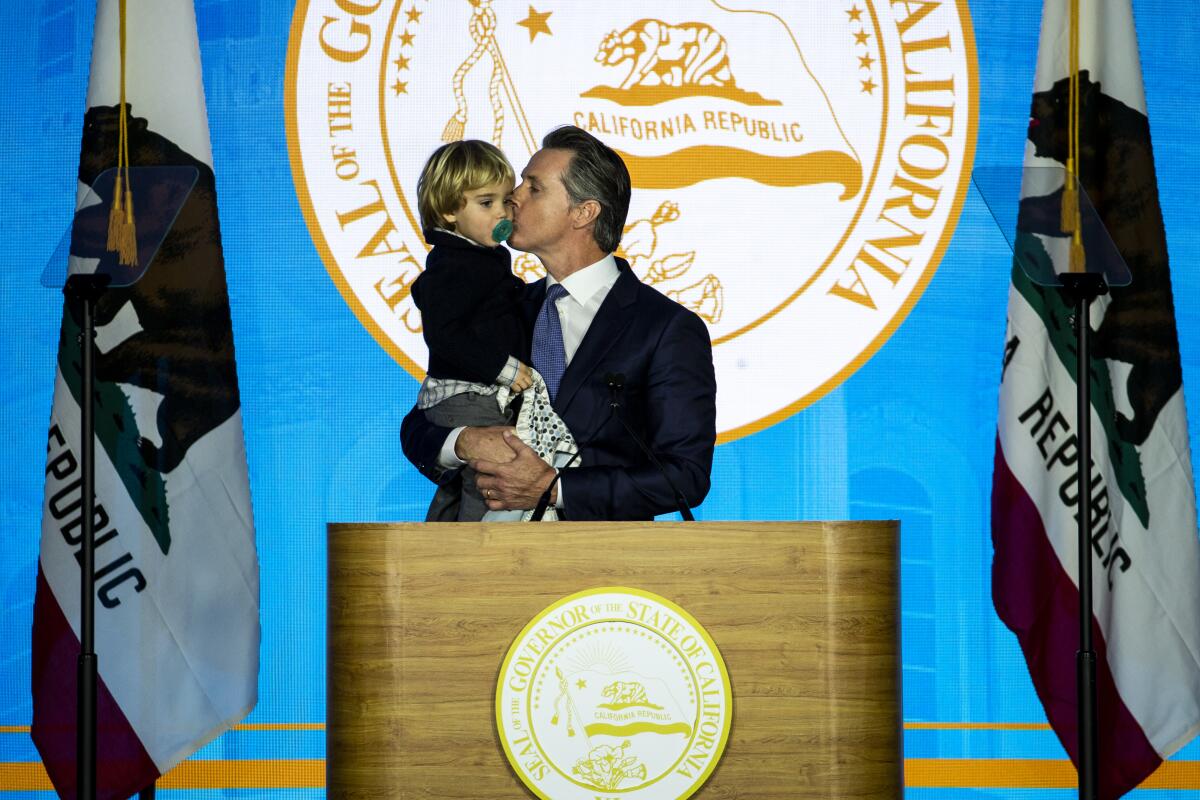Editorial: Congress failed the nation on family policy. Will California show the way?

- Share via
If he wanted to, Gov. Gavin Newsom could run for reelection this year boasting that he enacted a suite of family-friendly policies that President Biden has been unable to muster from Congress. It could also be a good campaign message if his speculated flirtation with running for the Democratic presidential nomination evolves into reality.
Biden ran in 2020 on a pledge to overhaul the nation’s caregiving system, proposing numerous measures to help families. The Democratic-controlled House passed the plan, including funding to make preschool available to 3- and 4-year-olds, provide child-care subsidies, extend a tax credit for people raising children and offer workers four weeks of paid leave to care for a new baby or sick family member.
But Biden’s incredibly important agenda to help parents and children stalled in the evenly divided Senate, doomed by opposition from Republicans and Democratic Sen. Joe Manchin of West Virginia.
Their shameful refusal to support American families means the United States keeps its ignominious rating as one of two nations in the world that does not ensure that parents can take paid time off work to care for a newborn. The U.S. shares that distinction, according to the World Policy Center, with Papua New Guinea, an agrarian island in the South Pacific with a population smaller than Los Angeles County.
California provides a vital counterpoint to Washington’s failure to support families. Newsom and the state’s Democratic-controlled Legislature have expanded California’s paid family leave from six to eight weeks, passed a $2.7-billion plan to make preschool available to all 4-year-olds by 2025 and boosted tax credits for families with young children. In many respects, California is “building back better” — to borrow Biden’s phrase — than the nation is.
But there’s an embarrassing weak spot in California’s family-friendly policies: The state’s paid family leave program helps white-collar professionals at the expense of low-wage workers.
Low-wage workers pay into California’s family leave system but usually can’t afford to take time off to care for a new baby or sick family member. Newsom should fix this.
Here’s how: Nearly all workers pay about 1% of their paychecks into a fund the state taps to give people a portion of their salary when they take leave to care for a sick family member or new baby. The payments amount to 70% of their usual paycheck for people who earn up to about $27,000 a year, and 60% for everyone else.
But many low-wage workers who pay into the system don’t take family leave because they can’t get by on a partial paycheck. Research shows that workers with annual salaries between $80,000 and $99,999 use paid family leave benefits at a rate four times higher than those earning less than $20,000. That means low-wage workers are paying for a benefit that they can’t afford to use. They’re subsidizing payments for people who earn more and can afford to take time off. That’s not fair.
Meanwhile, people who make more than $145,600 a year actually pay a smaller percentage of their salary into the fund than workers who make less than that. Because the 1% deduction stops for all earnings above $145,600, someone with a $290,000 salary pays about 0.5% annually into the fund, while someone who earns minimum wage pays 1%. Also not fair.
Newsom had a chance to fix these inequities last month when the Legislature sent him a budget that included a plan to raise the amount low-wage workers get during family leave to 90% of their regular pay. Taxes are not deducted from family leave payments, so the money would be roughly the same as normal take-home pay, allowing more workers to spend precious time with their babies and reap the benefits of improved physical and mental health and financial stability that research shows is associated with paid family leave. To cover the cost increase, the Legislature’s plan called for eliminating the cap on payroll deductions and taking 1% of every worker’s salary, regardless of income.
But Newsom did not sign off. It was the second time in as many years that the governor scuttled plans to increase family leave payments for low-income workers so they can afford to use the benefit. He vetoed legislation last year that would have paid for it by increasing payroll deductions for all workers by 0.1% to 0.2%, saying it would have cost money not accounted for in the budget and increased workers’ deductions.
It’s unacceptable that parents spend more on childcare than on housing in most of California. Families shouldn’t have to go broke raising the next generation of taxpayers.
Newsom intends to continue negotiating the issue with legislative leaders during the final month of the legislative session that begins next week, a spokesman for Newsom’s Department of Finance told an editorial board member. A bill that’s passed the state Senate and awaits action in the Assembly would raise family leave payments in the same way lawmakers proposed in their budget.
The ball is in Newsom’s court to come up with a plan he will support. Lawmakers have now sent him two different plans to ensure that Californians with low incomes can benefit from the paid family leave program they help pay for, and he’s nixed both of them. That’s a stain on his otherwise strong record of enacting policies to help California children and defies the spirit of the “parents’ agenda” Newsom and his wife, Jennifer Siebel Newsom, promoted together in the early years of his governorship.
It also flies in the face of the expert advice doled out in Siebel Newsom’s latest documentary film, “Fair Play.” The movie focuses on helping heterosexual couples with children communicate better about sharing domestic tasks. It makes the point that American families face extraordinary burdens in raising children in part because the nation has such weak federal policies when it comes to child care and family leave.
Making family leave affordable for all California workers should be a priority for the governor. If his Democratic colleagues in the Legislature can’t convince him, maybe his wife’s movie can.
More to Read
A cure for the common opinion
Get thought-provoking perspectives with our weekly newsletter.
You may occasionally receive promotional content from the Los Angeles Times.











